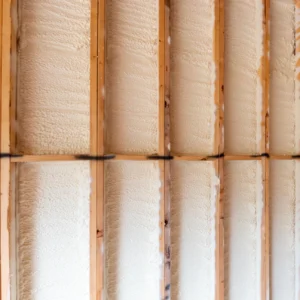Understanding Closed-Cell Spray Foam
Closed-cell spray foam insulation is a dense and effective option for insulating your home. It provides a strong barrier against air and moisture infiltration, creating a well-sealed building envelope. This type of insulation offers a high R-value, which means it has excellent thermal resistance properties. Due to its structure, closed-cell spray foam also adds structural strength to the surfaces it’s applied to.
 Structural Advantages of Closed-Cell Spray Foam Insulation
Structural Advantages of Closed-Cell Spray Foam Insulation
Closed-cell spray foam insulation provides excellent structural benefits for buildings. It strengthens and reinforces walls, roofs, and floors, adding structural integrity to your property. Here are some key advantages of closed-cell spray foam insulation:
- Strengthens Walls: Closed-cell spray foam fills in gaps and cracks, creating a solid barrier that can improve the structural strength of walls.
- Enhances Roof Stability: By adhering to the roof deck, closed-cell foam can help resist moisture and provide added support to the roof structure.
- Improves Floor Durability: When applied to floors, closed-cell spray foam can help reduce movement and increase the overall stability of the floor system.
These benefits make closed-cell spray foam insulation an excellent choice for enhancing the structural integrity of buildings.
Energy Efficiency Boost with Closed-Cell Spray Foam
Closed-cell spray foam can help improve energy efficiency in buildings by creating a tight seal that prevents air leakage. This insulation material has a high R-value, which means it’s effective at reducing heat transfer and keeping a space at a comfortable temperature. Here’s how closed-cell spray foam can boost energy efficiency:
- Creates a continuous air barrier that helps prevent drafts and heat loss.
- Provides a high level of thermal resistance, reducing the need for additional heating or cooling.
- Helps to minimize moisture infiltration, which can improve indoor air quality and prevent damage to the structure.
- Contributes to lower energy bills by reducing the workload on heating and cooling systems.
- Offers long-lasting performance, making it a cost-effective investment for improving energy efficiency in buildings.
Enhanced Moisture Protection
Closed-cell spray foam provides excellent moisture protection due to its dense structure. It creates a seamless barrier that prevents water and moisture from seeping through, helping to safeguard your home from potential damage like mold and mildew. The closed-cell structure of the foam also adds strength to the building structure and enhances its durability against moisture-related issues.
Increased Strength and Durability
Closed-cell spray foam provides increased strength and durability to structures. This type of insulation forms a dense and rigid material when applied, offering excellent support and longevity. The closed-cell structure prevents air and moisture infiltration, enhancing the building’s overall strength and resistance to wear and tear.
Soundproofing Qualities of Closed-Cell Spray Foam
Closed-cell spray foam is known for its excellent soundproofing abilities. It effectively blocks and absorbs noises, reducing the transfer of sound from one area to another. The dense structure of closed-cell spray foam acts as a barrier, preventing sound waves from traveling through walls, floors, or ceilings. When used in construction, this foam can help create a quieter and more peaceful indoor environment, minimizing disturbances from outside noises.
Thermal Performance Benefits
Closed-cell spray foam provides excellent thermal performance benefits due to its high density and ability to create an air-tight seal when applied. This helps in preventing heat transfer, keeping your space warmer in the winter and cooler in the summer. Additionally, the closed-cell structure of the foam provides increased strength and durability, making it a long-lasting solution for improving energy efficiency in buildings.
Environmental Impact of Using Closed-Cell Spray Foam
Using closed-cell spray foam insulation is considered environmentally friendly as it provides benefits like improving energy efficiency, reducing air leakage, and minimizing moisture intrusion. Closed-cell spray foam also aids in decreasing the overall carbon footprint of a building by helping to lower energy consumption for heating and cooling. Additionally, its durability can enhance a structure’s longevity, leading to less waste over time as repairs or replacements are less frequent.
Cost-Effectiveness of Closed-Cell Spray Foam in the Long Run
Closed-cell spray foam may have a higher initial cost compared to other insulation options, but its long-term cost-effectiveness is notable. This is due to its ability to provide superior insulation, leading to reduced energy bills over time. Its durability means that it can last for many years without needing replacement, saving you money on potential repairs or replacements in the future. Additionally, the energy savings it offers can contribute to lower heating and cooling costs, making it a cost-effective choice in the long run.
Conclusion: Why Closed-Cell Spray Foam Is a Smart Choice
Closed-cell spray foam is a smart choice for insulation due to its high R-value, which indicates its effectiveness in preventing heat transfer. It also acts as an air barrier, sealing gaps and cracks to reduce energy loss. Additionally, closed-cell spray foam provides structural support to buildings by strengthening walls and roofs. Its impermeability to water adds durability and protection against mold and moisture issues. Lastly, the longevity of closed-cell spray foam makes it a cost-effective and reliable option for long-term insulation needs.

 Structural Advantages of Closed-Cell Spray Foam Insulation
Structural Advantages of Closed-Cell Spray Foam Insulation